
TL;DR — Conversational Sales Platform
A conversational sales platform helps teams close more deals by centralizing customer chats, enabling real-time personalization, and scaling responses across channels without losing context.
Choose the right messaging channels based on where customers already are, then support rich features and security.
Use a conversational sales platform to drive personalization, engagement, and higher conversion rates through real-time responses and context.
Solve conversational sales challenges like multi-channel chaos, limited multi-user access, 24-hour windows, and manual routing by using an omnichannel conversational sales platform like respond.io including AI + automation.
In the dynamic realm of customer engagement, conversational sales platforms are a game-changer, blending real-time communication with personalized customer experiences.
This article explores the transformative impact of conversational selling versus traditional sales, examining its benefits, challenges, and why AI and omnichannel capabilities are essential for a conversational sales platform. It also showcases success stories of companies that have effectively adopted a conversational sales platform.
Additionally, we look at how platforms like respond.io offer innovative solutions to augment conversational sales strategies.
Conversational Sales: What is it?
The main difference between conversational and traditional sales methods lies in the type and direction of communication.
Conversational selling is a modern sales approach that focuses on dialog with the customer and a personal approach. In contrast to traditional sales methods, which are often based on one-way communication (cold calling), conversational sales is based on two-way conversations.
This approach uses digital channels such as messaging apps or social media platforms, to build a more intimate and responsive relationship with customers.
However, traditional sales methods tend to be linear and scripted, focusing on pushing a sales agenda.
Conversational Sales vs Traditional Sales
Conversational Sales | Traditional Sales | |
Communication Style | Interactive and two-way | One-directional |
Personalization | High level of personalization based on customer interactions | Limited personalization |
Customer Engagement | Immediate responses and interactions | Responses might be delayed or scripted and less interactive |
Technology Use | Reliant on AI, CRM systems and messaging channels | Less reliant on real-time communication technology |
Relationship Building | Focused on long-term relationships and building trust | Primarily transaction-focused |
Benefits | Improved customer satisfaction, engagement and loyalty | Structured process |
Conversational sales, with its focus on personalized and customer-driven interactions, uses conversational AI to enhance customer relationships and sales performance. By tailoring conversations to customers' preferences and behavior, businesses provide more engaging and relevant experiences, strengthening customer relationships.
Choosing the right messaging channels is critical to maximize the benefits of conversational selling. Your messaging channels of choice enable real-time, personalized interactions that are critical to the effectiveness of this modern sales approach. Next, we'll look at the key factors in selecting the right messaging apps.
Choosing the Right Messaging Channels
Choosing the right messaging channels is important for conversational sales as sales agents will engage into real-time interactions with customers. The right messaging apps not only facilitate conversations, but also significantly improves the overall sales strategy.
Here are some key considerations when choosing the right messaging channels:
Global popularity and reach: Identify messaging apps that are popular among your target audience or region of business.
Features and functionalities: Choose messaging channels that offer features for a dynamic conversational sales approach such as multimedia messaging and CRM integration which are important for a dynamic, conversational sales environment.
Reliability and security: Prioritize messaging channels known for their reliability and robust security measures to protect sensitive customer data.
User experience: A seamless and intuitive user experience for both the sales team and customers can have a significant impact on the success of sales conversations.
Voice communication: One of the best ways to sell is by talking to customers. While cold-calling turns people off, the ability for a customer to call a business to discuss a purchase adds a personal touch. Consider adopting voice communication channels or features like the WhatsApp Business Calling API to improve your agents' closing rate.
Next, we'll explore how adopting conversational selling can benefit businesses.
Turn customer conversations into business growth with respond.io. ✨
Manage calls, chats and emails in one place!
Benefits of Conversational Sales
Conversational sales offers various benefits for businesses in any industry. Let’s go through them here.
Conversational Sales Platform: Personalized Customer Experience
Conversational sales platforms enable businesses to tailor their communication to customer preferences, previous interactions and purchase history of each customer. This personalized approach goes beyond generic sales pitches and allows sales reps to offer solutions and products that are tailored to the customer's individual needs.
For example, respond.io enables Lifecycle tracking and management, so agents know exactly where a conract is in their journey. This level of personalization not only makes customers feel valued and understood, but it also increases the relevance and effectiveness of the sales interaction.
Conversational Sales Platform: Improved Customer Engagement
Real-time two-way communication in conversational sales significantly increases customer loyalty. Customers can have their queries addressed promptly and have a meaningful conversation instead of just receiving information. This continuous interaction keeps customers engaged and invested in the conversation, strengthening their relationship with the brand.
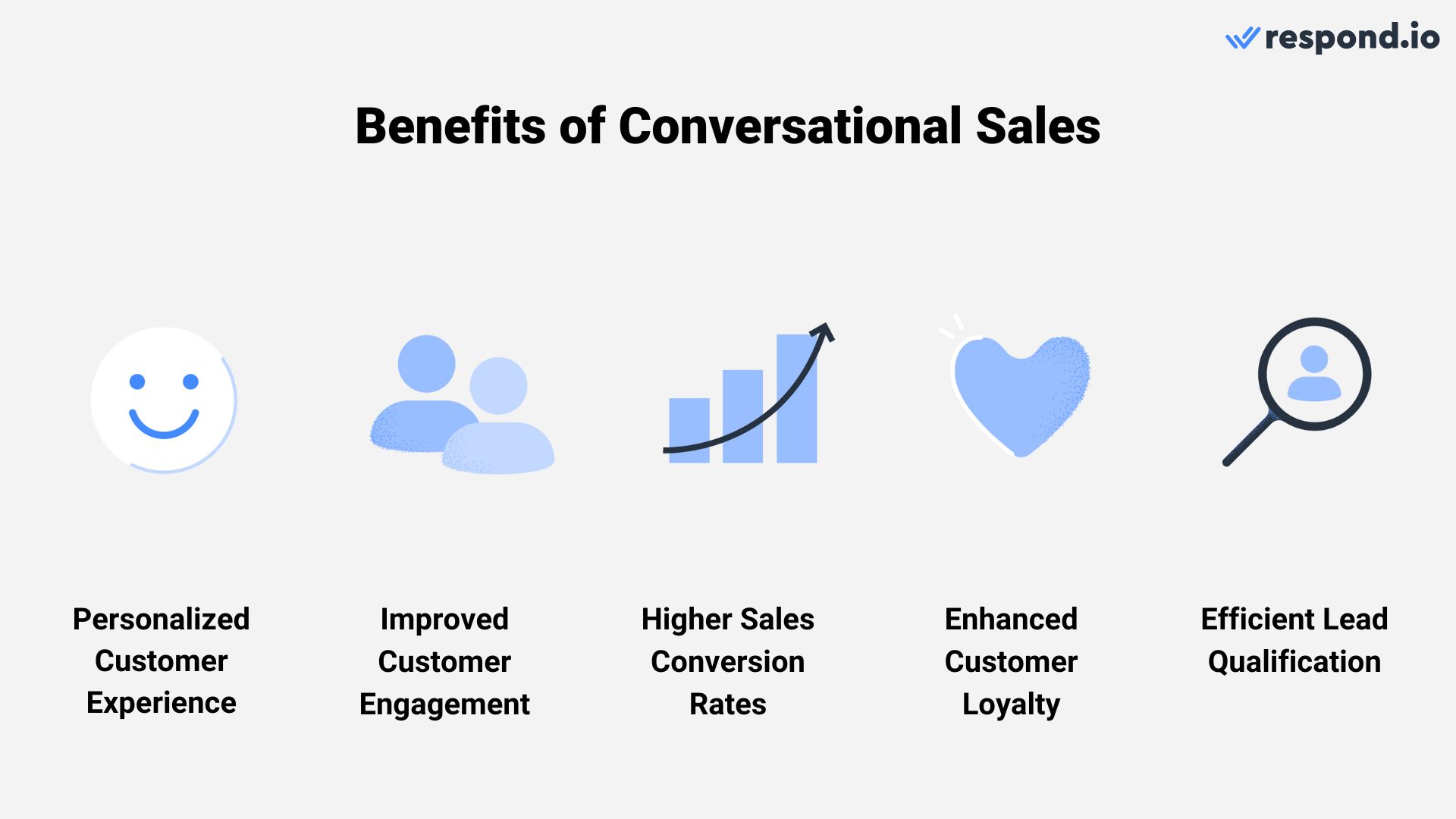
Conversational Sales Platform: Higher Sales Conversion Rates
Customers are more likely to make a purchase when they receive quick and personalized solutions to their queries, as opposed to generic responses or delayed communication common with traditional sales methods. By focusing on understanding the customer's needs and providing immediate, relevant responses, conversational sales can lead to higher conversion rates.
Enhanced Customer Loyalty
The personalized and responsive nature of conversational sales helps builds trust and credibility with customers. When customers feel that they are heard and valued, they are more likely to develop a sense of loyalty to the brand. This loyalty leads to repeat business, longer customer retention and often, customers become advocates for the brand, sharing their positive experiences with others.
Efficient Lead Qualification
Conversational sales enhanced with AI sales agents greatly streamline lead qualification. An AI agent can process initial inquiries, collect important information and assess lead potential. This allows sales reps to focus on high-potential leads and increase the efficiency and effectiveness of the sales process.
These advantages underscore the effectiveness of conversational sales in today's digital and customer-centric market. Building on these benefits, we'll delve into common challenges businesses face when adopting conversational sales strategies.
Challenges in Conversational Sales
Although conversational sales brings significant benefits, businesses need to be aware of the challenges involved. Here are some of the most common challenges that businesses face when adopting conversational sales. These challenges can often be solved with the right conversational sales platform.
Juggling Multiple Messaging Channels
Businesses may find it challenging to deliver quick and consistent responses across multiple channels such as WhatsApp, Facebook Messenger, Instagram, TikTok and web chat, which can lead to inconsistent service or delayed responses due to juggling multiple messaging channels.
Lack of Multiuser Access
Some channels, such as the WhatsApp Business app, support a limited number of users per account, making it difficult for businesses to handle a large number of requests efficiently and respond in a timely manner.
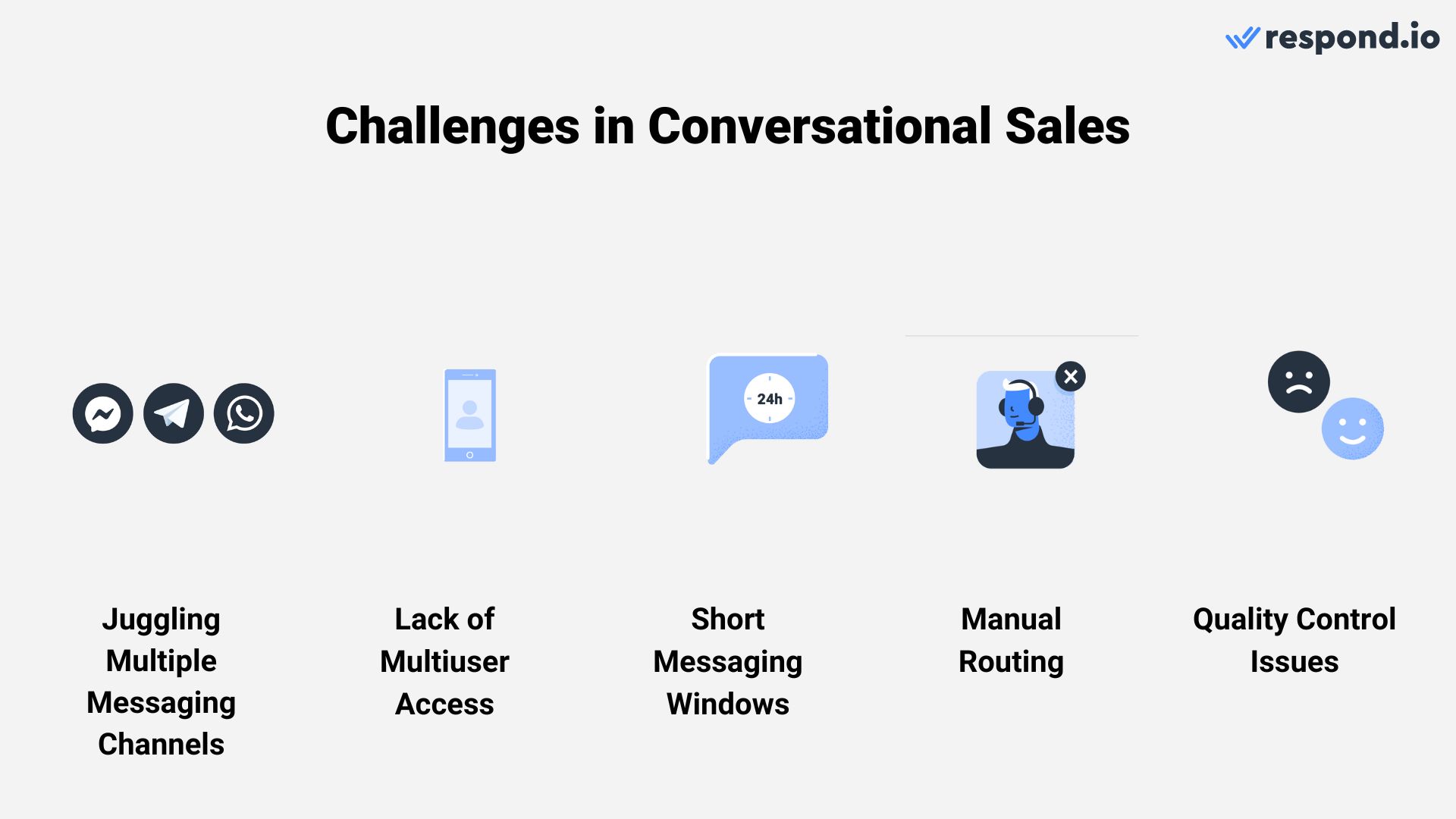
Short Messaging Windows
Certain channels such as WhatsApp API and Facebook Messenger enforce a 24-hour message window, making it challenging for businesses to respond within the given timeframe especially during busy periods or during non-operating hours.
Manual Routing
When businesses are dealing with customers across multiple platforms, manually routing to the appropriate team becomes time-consuming. This leads to delayed responses and potential customer frustration.
Quality Control Issue
Businesses often struggle to monitor conversation quality and agent performance when juggling multiple platforms or when sales agents utilize their personal phone devices to chat with customers.
While these challenges in conversational sales highlight the complexity that businesses face, they also pave the way for innovative solutions and success stories.
How Two Businesses Found Success in Adopting Conversational Sales
Let's explore real-life examples of how businesses harness conversational sales to increase customer engagement and boost sales.
Sport Center Los Naranjos Boosts Conversions with Omnichannel Convesations
Sport Center Los Naranjos was handling customer inquiries on multiple channels, like the WhatsApp Business app. However, due to limited multi-user access to the app, only a few agents were able to chat with customers at the same time, resulting in a delay in responses.
To streamline inquiry processing and supervision, the center sought to integrate its wellness management software with a business messaging solution, centralizing customer conversations and data while enabling multi-user access.
The center upgraded from WhatsApp Business App to WhatsApp API and connected it with Facebook Messenger and Instagram to respond.io. This integration allowed agents to efficiently handle omnichannel inquiries from a single platform, streamlining communication and improving response efficiency.

Sport Center Los Naranjos used respond.io's Workflows to automate frequently asked questions (FAQs) and responses, as most of their queries were predictable or revolved around similar topics.
In addition, Workflows helped route complex inquiries to the sales team and assign them to an available agent. The center also uses these conversations as an opportunity to add customers to a sales funnel.
As a result, the sports center was able to reduce first response time from 20 to 5 minutes, turnaround time from 5 to 1 minute, and convert 20% more subscribers from inquiries.
JU Productions Increases Sales 718% with Respond.io Conversational Sales Platform
JU Productions, a professional photography and digital marketing service, struggled to follow up with leads that it got through WhatsApp, Facebook and Instagram. Lead quality was also a challenge as agents were overwhelmed with spam and occasional offensive messages.
The business chose respond.io to manage conversational sales and connected it to WhatsApp API. To reduce spam, the business began to qualify leads with respond.io’s AI agents. An AI agent collects information such as brand name and service interest to filter out irrelevant contacts and route only high-intent customers to the team. Spam conversations are reviewed just once a day before being blocked, protecting employees while reducing operational overhead.
And without the need to deal with spam, analytics showed improvement in response and resolution times for real customers.
Additionally, the business used to send follow-ups to encourage customers and leads to sign up for a scheduled photoshoot session. Before using respond.io, this was a manual process as broadcast lists are limited on the WhatsApp Business App. Lack of follow-up led many potential customers to drop off. Now with respond.io, JU Productions schedules broadcasts in higher volumes and handles follow-ups with an automated workflow.

This approach boosted sales by an incredible 718%, while eliminating the manual effort of contacting each potential client one by one.
Businesses are undoubtedly benefiting from conversational sales, but in order to take full advantage of it, choosing the right conversational sales platform tailored to their specific needs is crucial. Let's explore how in the following section.
Leverage Conversational Sales With Respond.io
In this section, we will look at how businesses can use customer conversation management software, such as respond.io, to initiate their conversational sales approach.
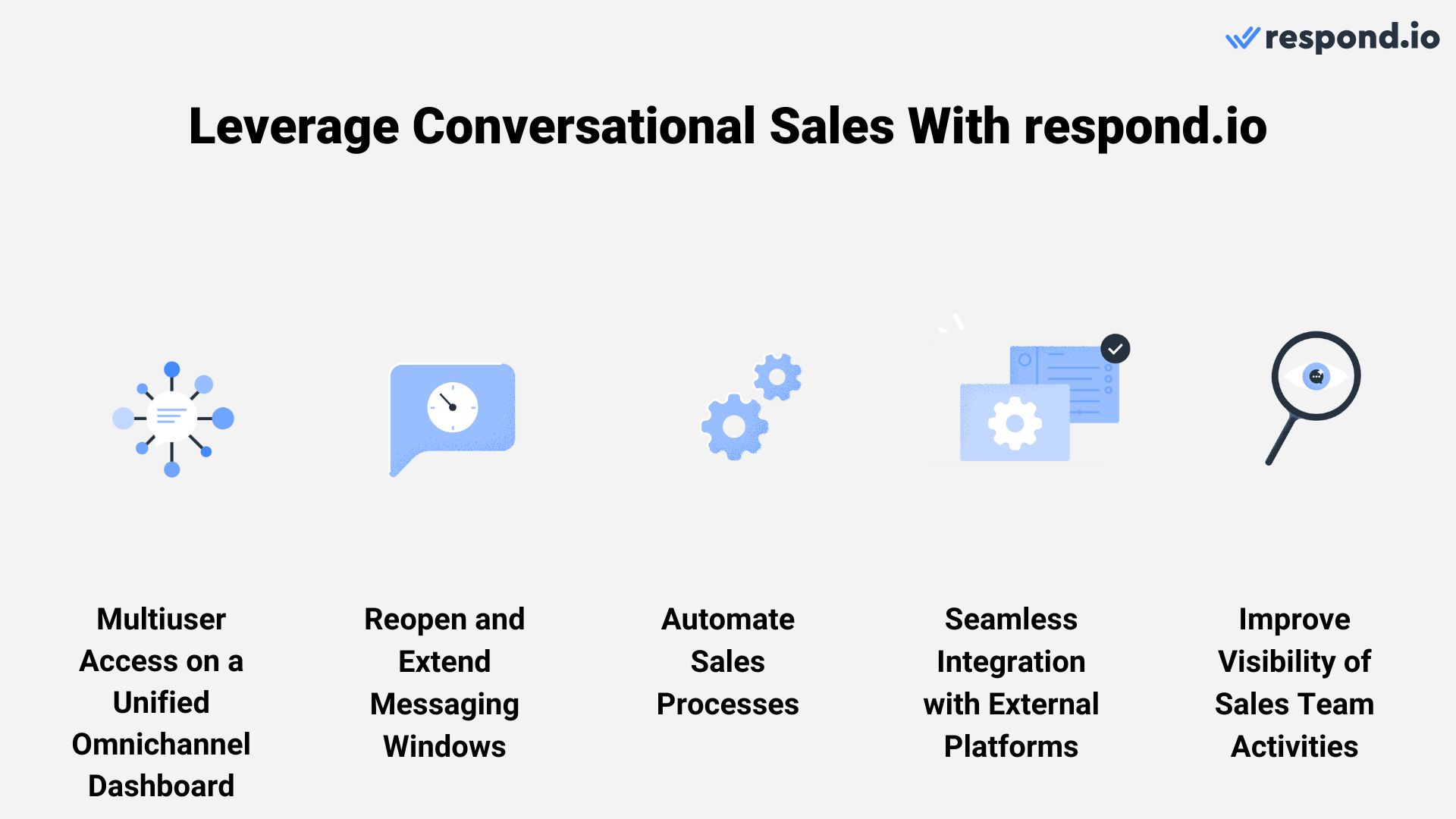
Multiuser Access on a Unified Omnichannel Dashboard
Businesses frequently face the challenge of connecting with customers across numerous instant messaging channels. The difficulty lies in managing and juggling different channels simultaneously, which leads to a high risk of missing messages from customers or not responding in time.
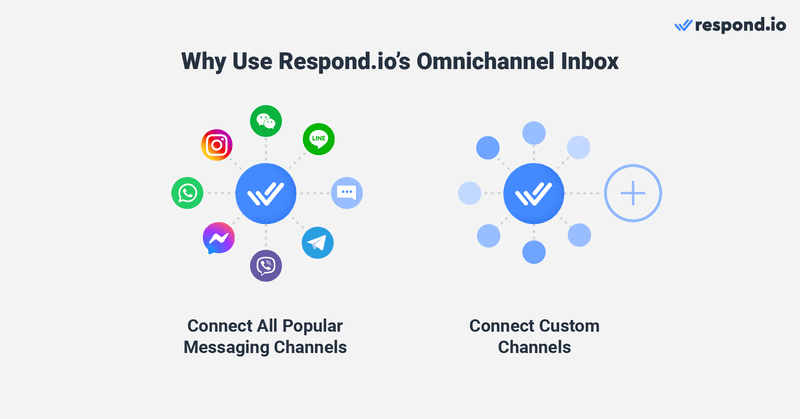
Respond.io solves these problems by supporting all popular instant messaging channels such as WhatsApp, Facebook Messenger, Telegram and custom channels, allowing businesses to consolidate conversations into a unified omnichannel inbox.
This streamlines communication for conversation sales and enables seamless responses to customers without juggling multiple platforms.
With respond.io's Contact Merge feature, businesses can unify customer profiles from different channels into one. This helps sales reps recognize returning customers and ensure customers’ details are up-to-date.
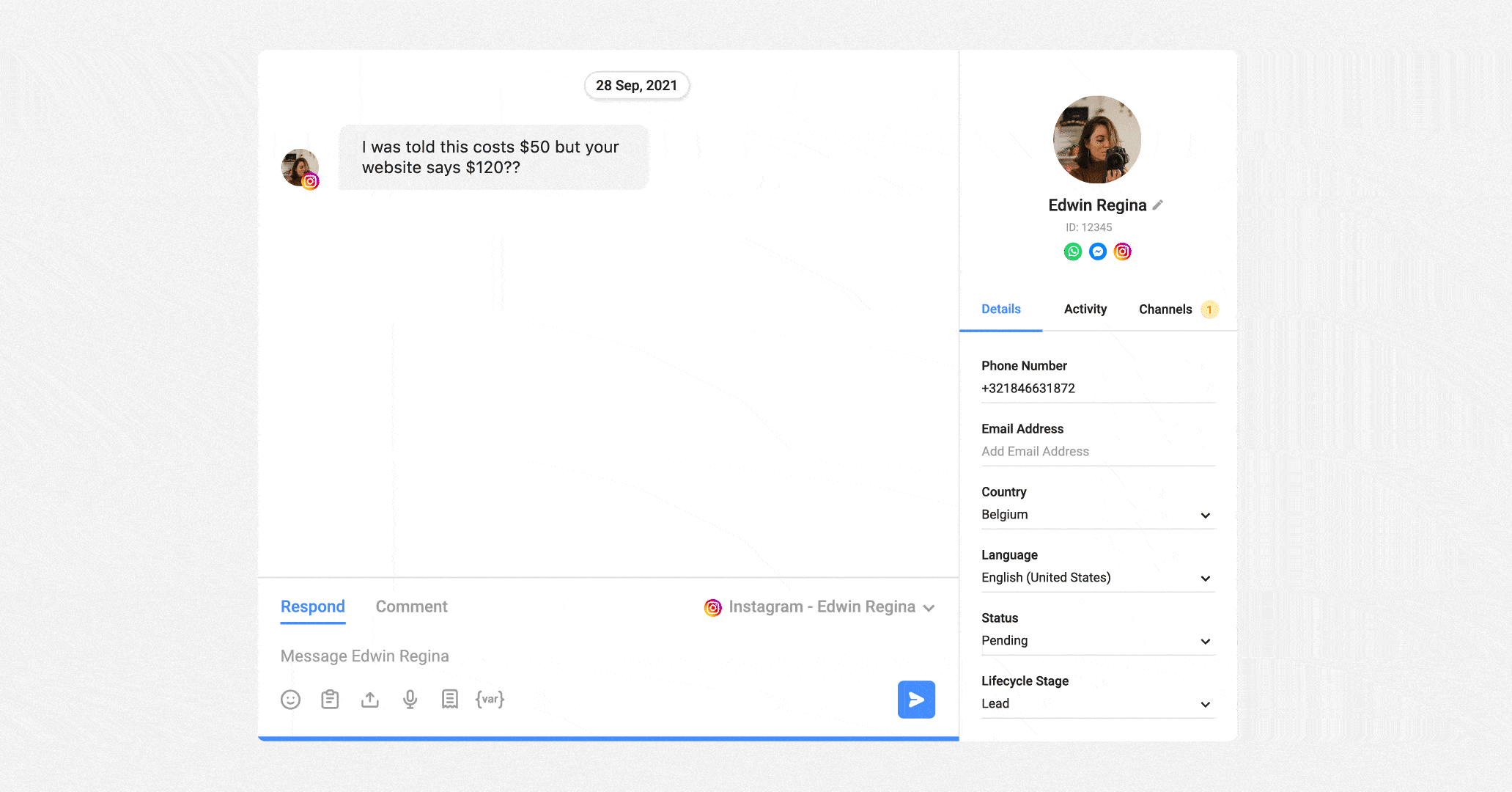
By minimizing clutter and giving sales reps a comprehensive view of customer interactions, businesses are empowered to make more informed customer care decisions and personalize their interactions more effectively.
The result is a seamless customer experience that ensures consistency across all communication channels used by the customer.
Reopen and Extend Messaging Windows
As mentioned earlier, short messaging windows are one of the common challenges in conversational selling. Due to this limitation, sales reps cannot communicate with customers unless customers reopen the messaging windows with a new message.
Respond.io provides businesses with solutions to resume conversations with customers across diverse messaging channels. With respond.io, businesses can create, validate and save WhatsApp API message templates to re-open the WhatsApp API messaging window.
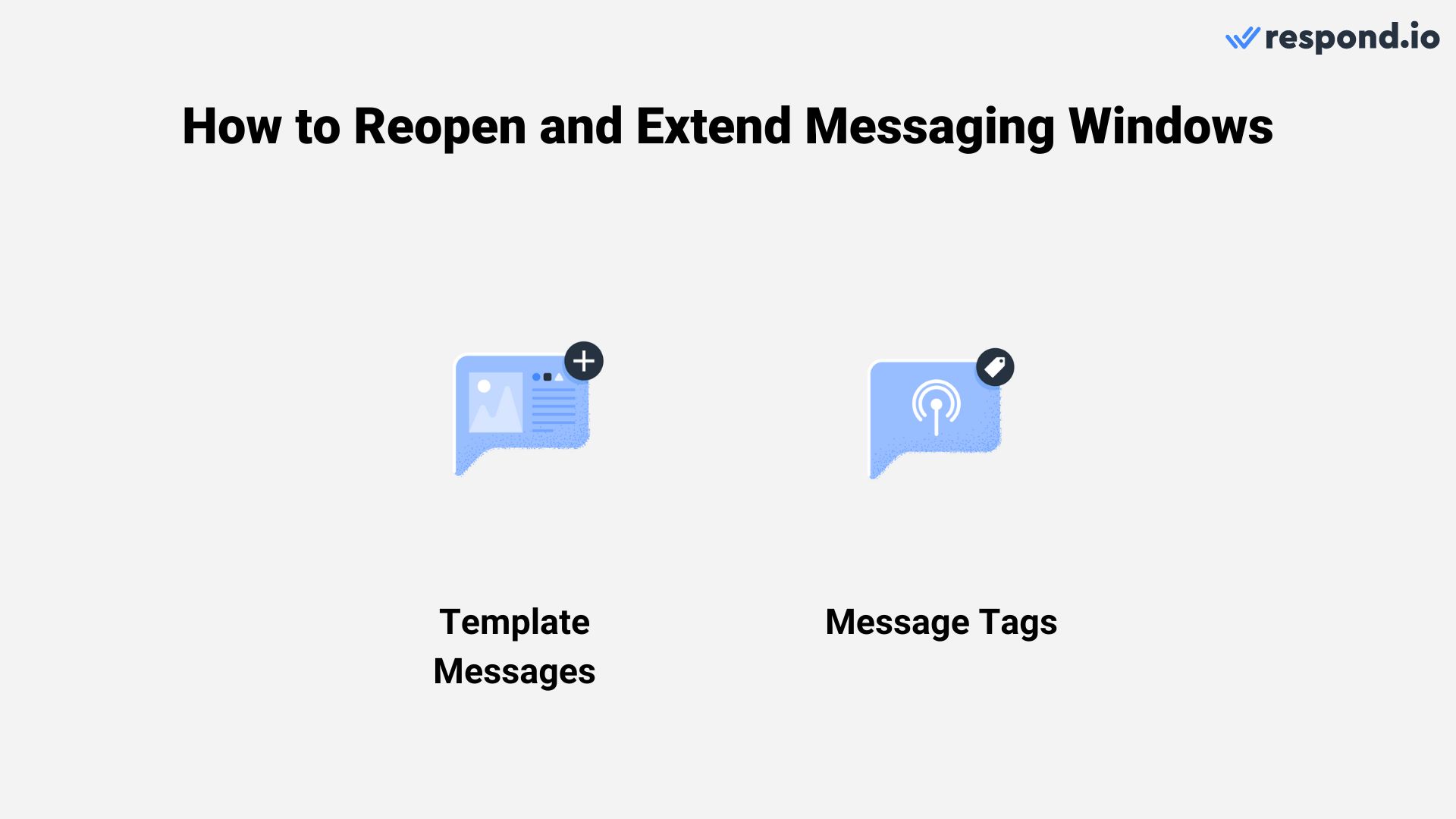
For the messaging window on Facebook Messenger, businesses can utilize Facebook Message Tag, which allows sales reps to e-engage with the customer for confirmed event and, post-purchase notifications as well as account updates.
In addition, respond.io is one of the few platforms that support the Human Tag Agent, which extends Facebook Messenger's window from 24 hours to 7 days.
Using these solutions to extend messaging windows and navigate conversation restrictions significantly improves ongoing customer engagement and sales interactions.
Use AI Agents to Automate Sales Process
In conversational sales, certain tasks can be repetitive and tedious for sales teams, diverting attention from more important sales activities. By automating these processes, sales reps can be more productive and focus on high-value interactions.
Respond.io's AI Agents can handle high volumes of inbound conversations, qualifying leads and routing them to an appropriate salesperson.
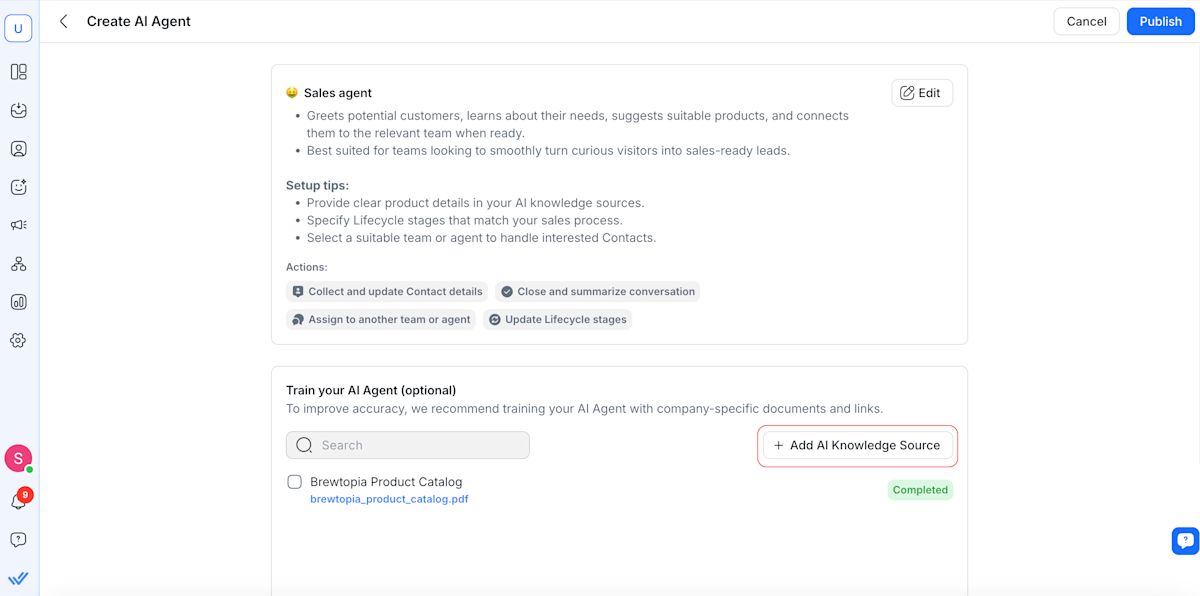
For example, an AI Agent can ask leads for their contact information, product interests and budget. It can even recommend products and once the lead is ready to make a purchase, the AI Agent hands off the conversation to a human agent to close the deal.
Automation streamlines sales process, enabling sales reps to quickly focus on understanding the needs of potential customers, significantly increasing the chances of a successful sale.
Seamless Integration With External Platforms
Businesses face major challenges with disjointed sales tools, especially the inconvenience of alternating between messaging platforms and CRM systems, leading to disrupted workflows and potential data inaccuracies.
With respond.io, businesses can integrate external CRM platforms such as HubSpot and Salesforce, enabling direct creation and update of customer records and deals without leaving respond.io platform. This integration streamlines conversational selling processes and ensures consistent, up-to-date customer data.
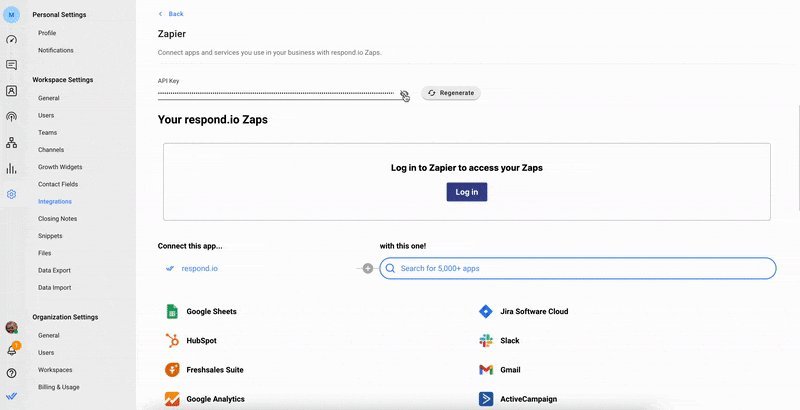
By integrating respond.io with Zapier and Make.com, businesses can connect to various applications, enabling the automation of a variety of tasks beyond CRM.
One notable example is the integration with Bigcommerce. This provides real-time updates of customer data between respond.io and BigCommerce and the ability to send messages to customers about their orders and abandoned cart messages to prompt purchases.
Improve Visibility of Sales Team Activities
In conversational selling, a common challenge is for businesses to store sales conversation records when their sales reps use personal devices to communicate with customers. This also disrupt the conversation’s continuity with customers when agents change or are absent.
Furthermore, the use of multiple phone numbers by sales teams can lead to confusion for customers as it lacks a unified point of contact, resulting in fragmented communication and potentially impacting the customer experience.
The lack of a shared inbox adversely affects brand image and customer experience and highlights the disadvantages of using personal phone numbers for sales.
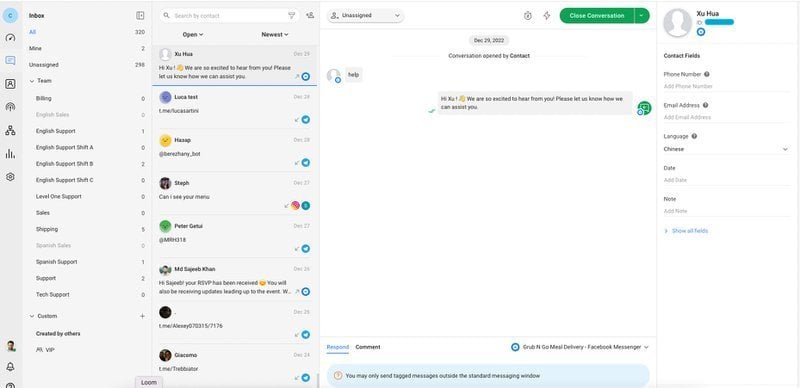
The Messages Module provides a single point of contact for sales reps to monitor and respond to inquiries across multiple channels. This gives businesses more visibility of sales agents’ conversations and activities and allows managers to monitor live conversations in real time.
The Reports Module provides insights into the sales team's performance insights enabling businesses to make data-driven decisions on sales strategies
In conclusion, conversational sales represent a potent strategy for businesses seeking deeper engagement with customers. By utilizing platforms like respond.io, businesses can transform their sales approach, fostering stronger customer relationships and driving enhanced sales outcomes.
Looking for a conversational sales platform to take your business to the next level? Try respond.io for free!
Turn customer conversations into business growth with respond.io. ✨
Manage calls, chats and emails in one place!
What is a conversational sales platform?
A conversational sales platform is software that helps sales teams sell through real-time messaging by organizing customer conversations, contact context and follow-ups in one place. Instead of treating chats as ad hoc messages, it turns them into a structured sales motion that can be managed, measured and improved. This is especially useful when leads come in from multiple channels and expect fast, relevant replies.
How is a conversational sales platform different from conversational sales?
Conversational sales is the approach: selling through dialogue, not one-way outreach. A conversational sales platform is the system that makes that approach scalable across teams and channels, with shared inbox access, routing, automation and reporting. In practice, many teams start with “we’ll just reply in WhatsApp/Instagram,” then realize they need a platform to maintain speed, consistency and visibility as volume grows.
What channels should a conversational sales platform support?
It should support the channels your customers actually use, ideally in the regions you sell into. For many businesses that means WhatsApp, Instagram, Facebook Messenger, web chat and email at a minimum, with the ability to add more as your mix evolves. Platforms like respond.io are often used here because they let teams consolidate popular messaging channels into one workspace instead of managing each channel separately.
Why does a unified inbox matter for sales?
A unified inbox reduces missed leads, duplicate replies and slow handoffs by keeping conversations centralized and accessible to the team. When a customer switches from Instagram to WhatsApp, or returns weeks later on a different channel, you can still see the full context and respond without restarting the conversation. This tends to improve response times and makes it easier to keep messaging consistent across reps.
Can multiple sales reps use the same WhatsApp or messaging account?
Yes, but it depends on the setup. Individual messaging apps often limit multi-user access, which creates bottlenecks when several agents need to reply at once. That's why you need a conversational sales platform. With API-based channel setups and a proper platform layer, multiple reps can work from a shared inbox concurrently, which is one of the reasons teams move from the WhatsApp Business App to WhatsApp API via platforms such as respond.io.
How does AI help in a conversational sales platform?
AI is most valuable when it takes repetitive tasks off your team’s plate, especially at the top of the funnel. It can ask qualifying questions, capture key details, filter spam and route high-intent leads to the right rep, so humans spend time where it matters. Some platforms, including respond.io, support AI agents that can run these flows at scale while still handing off to a salesperson when a lead is ready.
How do platforms handle WhatsApp and Messenger messaging windows?
Messaging rules can limit when you’re allowed to reengage customers, which can disrupt follow-ups and closing. A conversational sales platform helps teams stay compliant while keeping momentum, for example by using WhatsApp message templates to reopen conversations or using supported Messenger features that allow specific types of follow-ups. This matters for sales because timing is often the difference between a closed deal and a lost lead.
What integrations should a conversational sales platform have?
The most important integrations connect your conversations to your source of truth, usually a CRM. Look for native or reliable integrations with tools like HubSpot or Salesforce so customer data, deals and notes stay updated without reps switching tabs and re-entering information. Many teams also want connectors like Zapier or Make to automate downstream actions, and respond.io supports these kinds of integrations for keeping workflows connected.
Further Reading
Did you find this article useful? If so, here are some other quick reads that might interest you:






































 Electronics
Electronics Fashion & Apparel
Fashion & Apparel Furniture
Furniture Jewelry and Watches
Jewelry and Watches
 Afterschool Activities
Afterschool Activities Sport & Fitness
Sport & Fitness
 Beauty Center
Beauty Center Dental Clinic
Dental Clinic Medical Clinic
Medical Clinic
 Home Cleaning & Maid Services
Home Cleaning & Maid Services Photography & Videography
Photography & Videography
 Car Dealership
Car Dealership
 Travel Agency & Tour Operator
Travel Agency & Tour Operator




